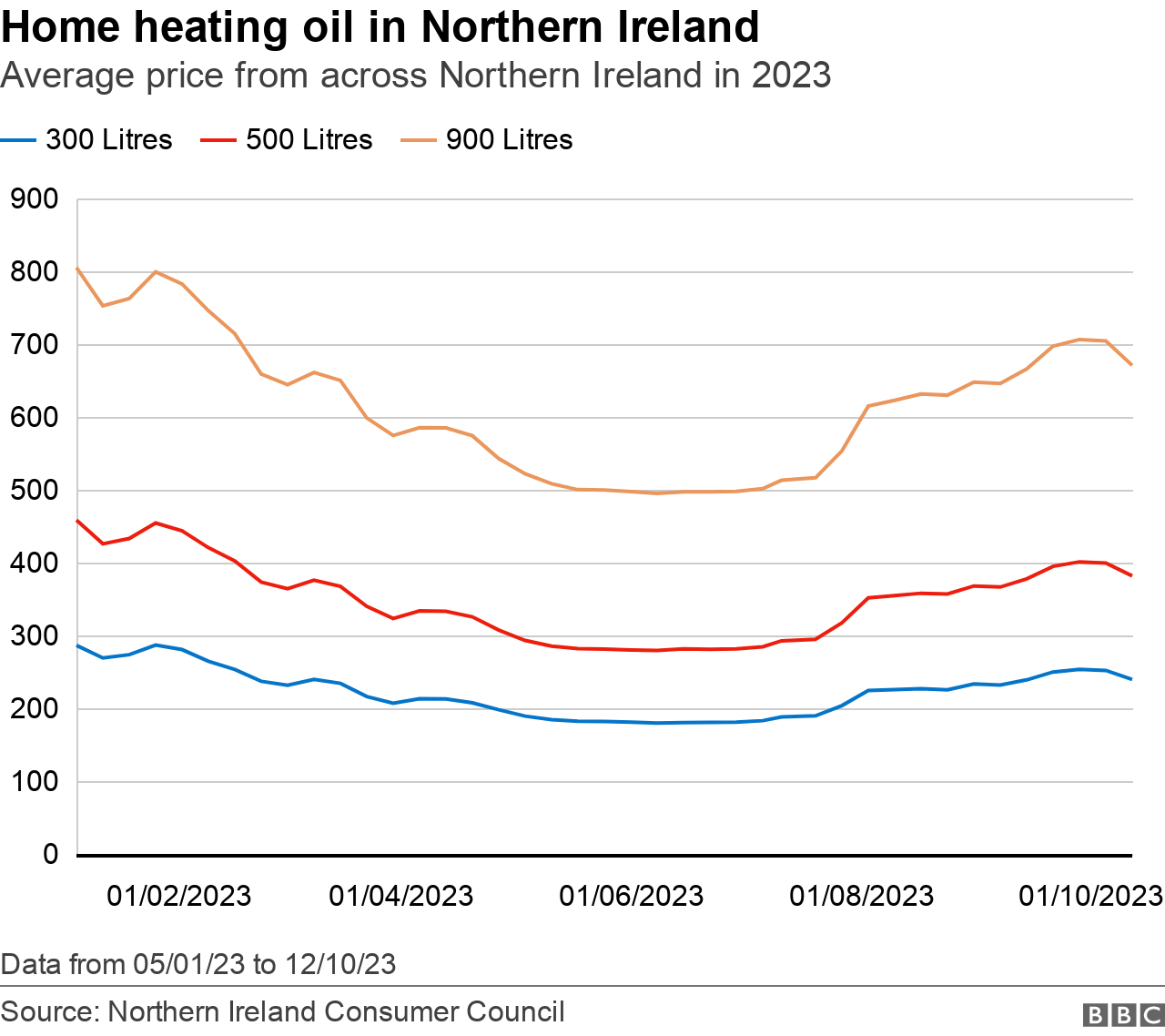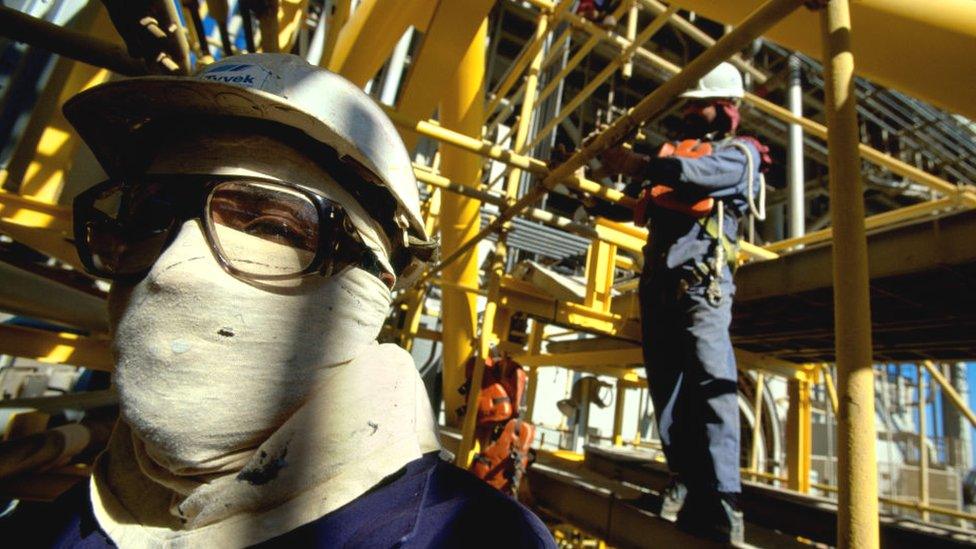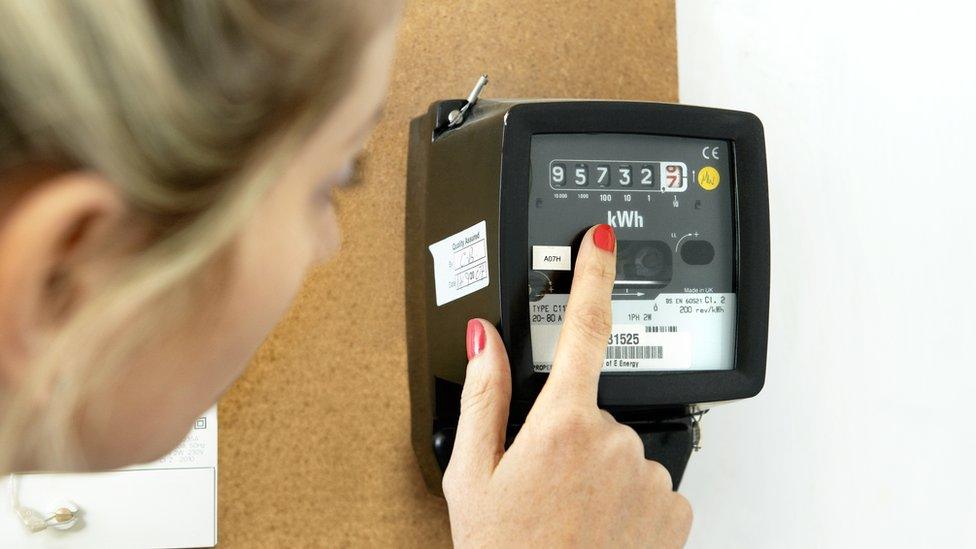Home-heating oil: 'Difficult winter' as Northern Ireland prices remain high
- Published

Home heating oil prices are down this week, but it may not be a sign of things to come
People in Northern Ireland are facing a "relatively difficult winter" as home-heating oil prices remain high, the Consumer Council has said.
About two thirds of households in Northern Ireland are heated using oil.
The average price of 500 litres of oil, according to the Northern Ireland Consumer Council, external, is £381.69 - a decrease from £399.29 last week.
While home-heating oil prices have significantly dropped in the last year, the long-term average is still costly.
It comes at a time when gas and electricity prices are also still at high levels - the Utility Regulator told BBC News NI that although the wholesale price of energy has reduced significantly over the last few months, it remains twice the price of historic norms.
According to the regulator, the average annual price of gas and electricity was £1,236 in October 2021 - in October 2023, this is now £2,415.
'People finding it tough'
Peter McClenaghan, director of infrastructure and sustainability at the Consumer Council, said lingering high prices are "quite unpleasant" for many consumers.
"While the prices are not as difficult as they were last winter for consumers, a lot of people are finding their money is not going as far elsewhere," he told BBC News NI.
"They're paying more for food, they maybe have depleted their savings in order to pay for energy or food inflation, so people are finding that relatively tough at the minute."

It is unlikely consumers will see the same energy support they received last year, Peter McClenaghan said
Just after Russia invaded Ukraine in February last year, the price of 500 litres of oil spiked to £660. It then cost between £400 and £500 for most of the year and fell in the early months of this year.
Earlier in 2023, the UK government introduced a £600 one-off payment in Northern Ireland to help tackle rising energy bills.
Mr McClenaghan said the scheme was "hugely valuable" in protecting consumers and more helpful than many may realise.
"We are in a situation now where the prices aren't just as high as they were last year but, in actual fact, if you remove the government subsidy, the effective price is pretty much the same as what people were paying last year.
"People are going to still have a very similar customer experience as they did last winter when it comes to trying to heat and power your home."


Wholesale oil prices have been on a general upward trend for the last few months.
A barrel of Brent crude was priced at below $80 a barrel at the end of July but is now closer to $90.
This is mainly because oil rich nations such as Saudi Arabia and Russia, which form part of a group called Opec+, have cut back production.
After Russia's invasion of Ukraine in February 2022 oil prices spiked; there has not been the same impact from the current Israel-Gaza conflict but that could yet change.
There is the spectre of the Yom Kippur War in 1973, external which saw oil producing countries, led by Saudi Arabia, refusing to supply countries which supported Israel.

What affects oil prices?
Oil prices can fluctuate due to a number of factors.
During the warmer months, prices for oil are normally lower due to a lack of demand.
In the last few months, prices have risen as some members of the oil producers' group Opec+ decided to cut its production of crude oil.
Exchange rates can also have an effect. Crude oil is traded in US dollars, and with sterling down this can increase prices both at the petrol pump and at home.

Home-heating oil prices are beginning to rise again, but are lower than they were at the beginning of the year
Recently, concerns have been raised about oil prices after militant group Hamas launched an unprecedented attack on Israel last week.
Global prices jumped following concerns the situation could disrupt output from the Middle East.
Israel and the Palestinian territories are not oil producers but the Middle East region accounts for almost a third of global supply.
David Blevings, executive director of the Northern Ireland Oil Federation, said prices have come down after an initial spike as other oil-producing countries, such as Saudi Arabia, stepped up production.
But, he added it is too soon to tell what long-term effects it may have.
"Short term, I don't see a huge change, it depends what happens in Gaza," he told BBC Radio's Good Morning Ulster programme.
"If we do have a major war in that scenario, I could definitely see supplies being hit and the price will unfortunately go up."
Mr McClenaghan echoed this view, adding that the panic in the market has somewhat dissipated and is minor in comparison to how it reacted to the Russian invasion of Ukraine.
Related topics
- Published9 October 2023

- Published20 September 2023

- Published19 September 2023

- Published2 June 2023
